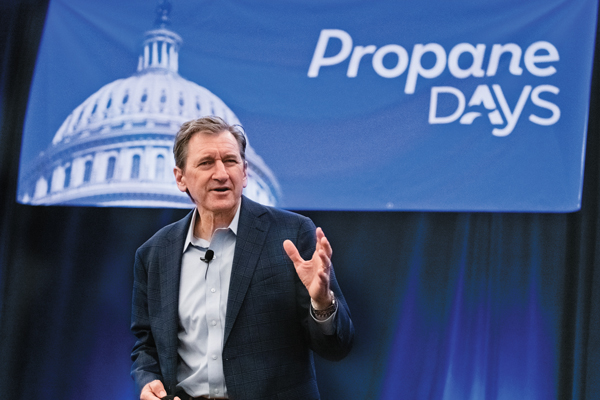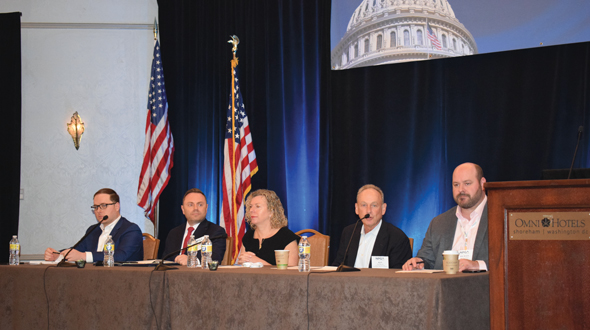The dual challenge: Reframing the debate on energy, environment
No one owns the truth. Shaming is destructive. Civil dialogue is vital. Scott Tinker’s words.
The global debate on energy and environment rages over the issues surrounding climate change, carbon emissions and reduction solutions.
“There are a lot of sides,” Tinker says. “We’re complex beings.”

Scott Tinker talks energy and the environment during Propane Days in Washington, D.C. (Photo by Rodney Choice for NPGA)
As a guest speaker at the National Propane Gas Association’s (NPGA) Propane Days in Washington, D.C., Tinker displayed a calm demeanor as he outlined what he calls “the dual challenge” of energy and the environment – specifically, energy access for all and environmental protection. It’s a presentation he’s also given as a TEDx Talk.
Tinker, director of the Bureau of Economic Geology at The University of Texas, Austin, relates the importance of energy to that of food (his wife has a food science degree). He explains how food processes impact the environment and questioned: Should we end food? Instead, he suggests working to clean the environment related to food.
What about energy?
“Everything in our lives depends on energy,” he says.
Not only that, he adds, but energy is connected to major global issues such as poverty, security and emissions. Like food, energy processes impact the environment. So, should we end energy?
Balanced diet
Tinker relates the discussion about food and energy to low-density and high-density solutions.
There’s low-density food like kale, but also low-density energy like solar, wind, biomass and batteries. There’s high-density food like beef, but also high-density energy like coal, oil, natural gas and nuclear. The solutions are composed of renewable sources on one side with fossil and nuclear sources on the other.
And just like it’s beneficial to eat a balanced diet, he says, it’s beneficial for countries to adopt a balanced energy mix. Growing populations and economic development require dense solutions to meet energy demand.
“A mix of energy gives us energy security,” which every leader in the world seeks for the people, he says.
Tinker’s traveled to 60 countries, where he’s witnessed both extreme wealth and extreme poverty. The worst environments in the world are where it’s poor. In fact, he says, four of five people live in emerging or developing countries. The best environments are where it’s rich.
“Energy won’t end poverty, but we can’t end poverty without energy,” he says.
An energy mix helps to provide security and, for those in emerging and developing countries, alternate sources with which to cook – not dung and wood that’s used indoors, contributing to diseases that kill millions of people annually. He recognizes propane as a clean cooking solution.
Factually complete?
Tinker builds his discussion around the ideas of “completely factual” and “factually complete,” the latter based on seeking the truth.
What’s fact: Coal and oil are dense; they make a lot of carbon dioxide, and they are still growing globally. They remain 60 percent of the world’s energy because they’re affordable and reliable, Tinker says.
Natural gas and nuclear energy are growing globally as well; they’re dense and make less carbon dioxide than coal and oil.
He explains how renewables – hydro, solar and wind – are growing globally and don’t make much carbon dioxide.
In fact, “Solar and wind are the fastest-growing energy sources,” he adds, calling the statement completely factual.
What would make it factually complete, Tinker asks? Scaling renewable production against the world’s energy consumption and seeing how the renewable sources don’t keep up with energy demand.
Most of the world’s energy growth and emissions come from Asia, Tinker explains, mainly due to coal power and the energy security it provides.
“Coal is Asia’s story today,” he says. “Natural gas is a global story.”
Tinker labels countries as consumers or producers, saying how most rich nations like the U.S. consume more than they produce. China produces more than it consumes.
He asks audience members from where most of their products come and suggests the U.S. is simply shifting its emissions overseas.
“The pledging of ‘zero emissions’ is a shell game,” he says. “It’s not an energy transition; it’s an emissions transition.”
Earth’s pillars
With only one atmosphere in the world, as Tinker emphasizes, environmental protection involves caring for all of Earth’s interconnected pillars: the land, air and water.
Tinker shifts his presentation from the air to the land, as he shows pictures of large copper and lithium mines.
“Why do we need lithium and copper?” Tinker asks. “Batteries.”
He does the math on electric vehicles, explaining how each vehicle includes 7,000 batteries. The world would need 4.9 trillion batteries to power half of the electric vehicles, and it would take 37 years to make them.
“They wear out, and you have to make them again. Where do they go when they wear out?” he says of the batteries. “Solar panels: Where do they go when they wear out?”
He shows pictures of wind turbine blades cut and buried in the land.
Mining the materials to make electric vehicles (and their charging stations), solar panels and wind turbines takes energy. The process impacts the land and the environment.
He tells audiences: “You’re not going to like me” and then suggests “no form of energy is renewable.”
The sun and the wind are renewable, he says, but the panels, turbines and batteries are not. Energy production uses all of Earth’s resources.
“Large-scale energy systems have large-scale environmental impacts,” he says. “We mine and manufacture, and we do it again when they wear out.”
The key, he says, is knowing and learning how to mitigate the impacts.
Tinker’s point: “These things need to be thought about” by having all sides come together to discuss the issues of energy and the environment.
Turning on the lights
Tinker presents a satellite’s view of a global map.
The lights are off, and it’s dark in poor countries that lack energy. Conversely, the rich countries light up on the map.
But then he considers what the map would look like if the world rid itself of coal and oil. It begins to darken. He does the same with natural gas and nuclear. It darkens further.
What’s left are the renewables, enough to produce 10 percent of the world’s energy needs, he says. Darkening the world’s lights by 90 percent doesn’t seem like the future, he says. It seems more like the past.
Turning the lights back on for a billion people brings many opportunities for them and helps address the world’s most serious issues: feeding and clothing the population, providing shelter and clean water as well as education and health care, and allowing for the migration away from autocrats.
“Climate change is really important in the world,” he says, “but it’s not the only thing.”
Tinker says the world needs to reduce the impacts of all energy by investing in the environment with a healthy economy – a goal that requires nonpartisan, critical thinking.
The dual challenge is solvable, Tinker says, “if we work as one team.”
Propane can be part of the solution. Tinker recognizes the benefits of the energy source and says people choose propane because it’s clean, reliable and affordable.
NPGA President and CEO Steve Kaminski called Tinker’s address one of the highlights of Propane Days.
“Dr. Tinker’s talk was data driven, thought provoking, and generated an audible positive buzz,” Kaminski says. “He hit the right balance of engaging the audience and providing new perspectives by putting into context the challenges of energy access and environmental responsibility that comes with the use of all large-scale energy systems.”
Speak up for propane
In addition to discussing “The Dual Challenge,” Tinker advises propane industry members to get the positive word out about their energy source. “When was the last time you spoke to 20 people [about the benefits of propane]? Do it. You’ve got to get a little active,” he says. Despite the calls of some billionaires, politicians and media members to promote only certain solutions related to energy and the environment, Tinker says, there are “a lot of people willing to go against the radical base,” and it’s important to educate them about the issues. Make sure to engage local leaders as well, he says.
Watch Tinker’s TEDx Talk on the topic, “The Dual Challenge: Energy and Environment”
Propane Days takeaways

NPGA’s Michael Baker, right, and Andrew Healey, left, moderate an energy coalition panel. (Photo by LP Gas staff)
The National Propane Gas Association’s (NPGA) modified its Propane Days format for the second straight year, building its agenda around speakers and panels and not meeting with legislators on Capitol Hill. The association looks for those meetings to return next year, as it anticipates easier access to the offices.
“What we can achieve as an association is not possible without your participation,” says Michael Baker, vice president of federal legislative affairs at NPGA. “You are the backbone for creating what’s possible from an advocacy effort.”
This year, NPGA assembled an energy coalition panel, provided an overview of its own congressional meetings, held an “across the aisle” forum and a “fireside chat” with Drue Pearce, the former deputy administrator of the Pipeline and Hazardous Materials Safety Administration.
A few key takeaways:
⦁ The bipartisan infrastructure law has created opportunities for the propane industry, including for transportation applications such as the Environmental Protection Agency’s Clean School Bus Program and propane refueling infrastructure.
⦁ Political insiders are forecasting a Republican majority in the House after the fall midterm elections.
⦁ The political environment in Washington, D.C., is not as contentious as portrayed in the media. “A lot of men and women who come to D.C. come here for the right reasons and want to represent their constituents to the best of their ability,” says Randi Reid, partner at lobbying firm Kountoupes Denham Carr & Reid. “There’s still a lot of across-the-aisle relationships that happen in order to get important issues done on a daily basis.”
















